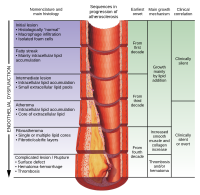
Photo from wikipedia
Purpose The aim of the study was to assess the predictors of adherence among elderly on antihypertensives and to examine the difference in adherence among males and females. Patients and… Click to show full abstract
Purpose The aim of the study was to assess the predictors of adherence among elderly on antihypertensives and to examine the difference in adherence among males and females. Patients and Methods Cross-sectional survey design was adopted for the study. The data were collected from 800 patients of age 60 years and above using demographic proforma, clinical proforma and Morisky Medication Adherence Scale (MMAS-8) with due approval from the institutional ethical clearance committee and written informed consent from the participants. Results The findings revealed no significant difference in the non-adherence rates among males and females. Number of medications was identified as the major predictor of adherence. Conclusion Awareness of factors influencing medication adherence is crucial for health professionals to provide appropriate advice for patients to maintain quality health. The findings of the study highlight the importance of nurses’ role towards imparting knowledge on hypertension and emphasizing on the importance of adherence to antihypertensives among elderly.
Journal Title: Patient preference and adherence
Year Published: 2022
Link to full text (if available)
Share on Social Media: Sign Up to like & get
recommendations!